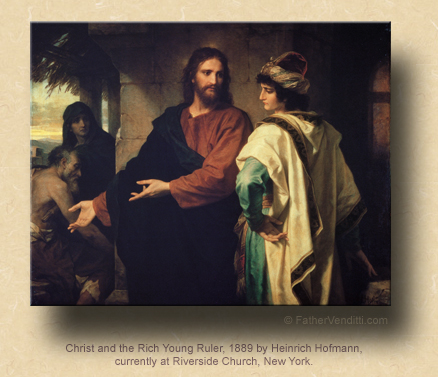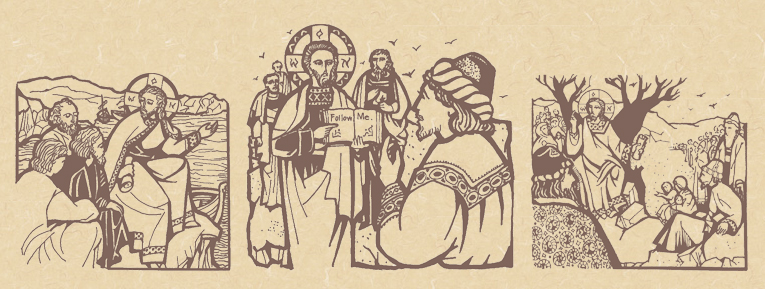Waiting for Reason to Catch Up with Emotion.
The Eighth Monday of Ordinary Time; or, the Memorial of Saint Casimir*
Lessons from the primary feria, according to the ordinary form of the Roman Rite:
• Sirach 17: 20-24.
• Psalm 32: 1-2, 5-7.
• Mark 10: 17-27.
|
When a Mass for the memorial is taken, lessons from the feria as above, or from the proper:
• Philippians 3: 8-14.
• Psalm 15: 2-5.
• John 15: 9-17.
…or, any lessons from the common of Holy Men & Women for One Saint.
|
The Third Class Feast of Saint Casimir, Confessor; and, the Commemoration of Saint Lucius, Pope & Martyr.**
Lessons from the common "Os justi…" of a Confessor not a Bishop, according to the extraordinary form of the Roman Rite:
• Ecclesiasticus 31: 8-11.
• [Gradual] Psalm 91: 13-14, 3.
• [Tract] Psalm 111: 1-3.
• Luke 12: 35-40.
|
When a Mass for the commemoration is taken, lessons from the common "Si díligis me…" for One or Several Holy Popes:
• I Peter 5: 1-4, 10-11.
• [Gradual] Psalm 106: 32, 31.
• [Tract] Psalm 39: 10-11.
• Matthew 16: 13-19.
|
FatherVenditti.com
|
7:14 AM 3/4/2019 — The rich young man of today’s Gospel lesson is interesting because he’s so completely human; we can see ourselves in him on so many levels. Put yourself for a moment in his shoes. What would each of us ask our Lord if we should chance to meet Him face to face? I should like to think we would ask the same question he does, as it's the most quintessential question a man can ask: “What must I do to be saved.” Our Lord’s answer is as simple and as complete as the question: “Keep the Commandments.” But he wants more than that. He wants to join our Lord and become a disciple. Our Lord gives him that chance, but first explains to him what he must give up to make that happen, as He would be obligated to do.
Now, this is not the first time someone has asked our Lord this question. This Gospel lesson about the rich young man begins in exactly the same way as the lead-in to the familiar parable of the Good Samaritan (cf. Luke 10: 25-37); in that episode, our Lord is approached by a rabbi who asks our Lord the very same question: “What must I do to be saved?” and he gets from our Lord the very same answer that our Lord gives the rich young man today: “Keep the Commandments.” But even though they both ask the same question and get from our Lord the same simple answer, each of them reacts to our Lord’s answer differently because each one has a different motive in asking the question.  The rabbi, according to Saint Luke, wants to justify himself (cf. Luke 10: 29); the rich young man sincerely wants to do more out of the generosity of his heart. And our Lord is clearly moved by this young man's sincerity, as evidenced by the phrase: “Jesus, looking at him, loved him…” (Mark 10: 21 NABRE); and, it is not a coincidence that what our Lord asks of the young man—to sell all his possessions and give the money to the poor—was what He asked of the original Twelve Apostles. The young man goes away sad because he’s not willing to do those things, and it's not hard to understand what’s happened to him here. The rabbi, according to Saint Luke, wants to justify himself (cf. Luke 10: 29); the rich young man sincerely wants to do more out of the generosity of his heart. And our Lord is clearly moved by this young man's sincerity, as evidenced by the phrase: “Jesus, looking at him, loved him…” (Mark 10: 21 NABRE); and, it is not a coincidence that what our Lord asks of the young man—to sell all his possessions and give the money to the poor—was what He asked of the original Twelve Apostles. The young man goes away sad because he’s not willing to do those things, and it's not hard to understand what’s happened to him here.
He’s obviously been following our Lord around for some time, and has been very much impressed. He’s got money, which means he’s probably lived a very sheltered life, and never been exposed to any kind of cause to which he might want to dedicate himself. Jesus comes along and ignites in him a youthful vigor for something to give his life meaning, and he allows himself to be caught up emotionally. He sees the camaraderie between Jesus and His disciples, and he wants to be a part of it, but his emotional needs are not matched by the will to actually do what is required to fulfill them. His emotional attraction to the whole “Jesus thing” has blinded him to the fact that, in reality, he’s not ready for the kind of commitment that is needed for him to actually join Jesus and become one of His disciples.
When our Lord asked the rich young man to sell everything he had and follow Him, He knew the young man wasn’t ready. He asked him anyway because He knew that it was the only way to force the young man to come face to face with the reality of his life. Unfortunately, the Gospel passage ends with the young man walking away sad, but that doesn’t mean that he walked away for good. For all we know, he grew up to develop a whole new set of priorities and, after our Lord’s resurrection, may have become a passionate member of the early Church.
The lesson for us here is that the sadness he felt as he walked away was not necessarily a bad thing. Pain makes us think. And when we encounter pain in our lives because we feel we’ve been denied something we want very badly, maybe it’s time to sit down and consider what it is that our Lord is asking us to think about.

* Casimir (1458-1484) was the son of Casimir IV and Elizabeth, King and Queen of Poland and Lithuania. In contrast to other members of the royal court, he was an example of faith, piety, humility and chastity. He had great devotion to the Eucharist and the Mother of God, and is the patron of Poland and Lithuania.
** Pope St. Lucius was beheaded for the sake of the Name of Jesus in the year 254.
|

